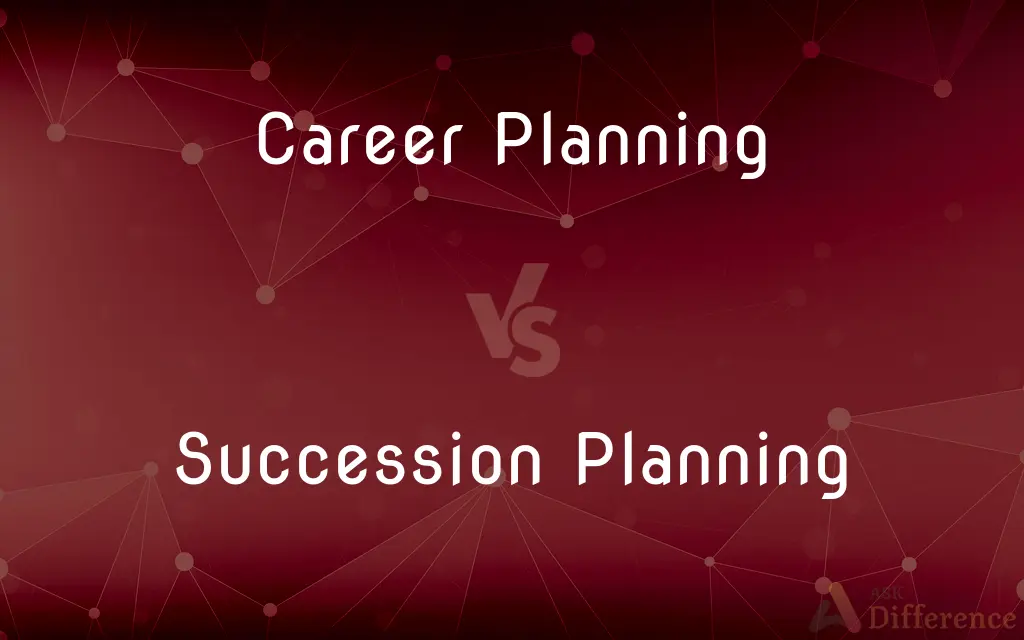Career Planning vs. Succession Planning — What's the Difference?
By Tayyaba Rehman — Published on October 10, 2023
Career Planning involves mapping out an individual's career path and progression, while Succession Planning is a strategic process ensuring staff readiness to assume key roles within an organization.

Difference Between Career Planning and Succession Planning
Table of Contents
ADVERTISEMENT
Key Differences
Career Planning is the proactive process wherein an individual outlines goals and strategies for their career progression and development. It involves identifying career goals, establishing a strategy, and adopting a step-by-step approach to achieve them. Career Planning is a continual process that helps individuals make career-related decisions and helps them understand the path they need to undertake to pursue their career goals.
Conversely, Succession Planning pertains to the organizational strategy focused on identifying and developing potential leaders or successors within the organization to fill key leadership and critical roles when incumbents leave or retire. Succession Planning ensures that businesses continue to run smoothly by preparing for a transition in leadership, preventing gaps that can negatively impact the company’s performance and stability.
A pivotal point in Career Planning is that it primarily centers on the individual. The individual explores various career options, identifies goals, establishes a plan, and undergoes relevant training or educational programs to facilitate their desired career trajectory. Career Planning is typically a self-oriented, future-focused process that engages the individual in a journey towards their career aspirations.
In stark contrast, Succession Planning puts the organization at the forefront. It is driven by the organizational need to safeguard itself from abrupt disruptions due to the sudden departure of key personnel. Succession Planning involves identifying high-potential employees, providing them with targeted development and training to ensure they can step into crucial roles effectively when needed.
In essence, Career Planning spans various stages, which include self-assessment, skill assessment, exploring career opportunities, and setting career objectives. It is pivotal in helping individuals navigate their professional paths, ensuring they possess the necessary skills and knowledge to progress in their chosen careers.
ADVERTISEMENT
On the other hand, Succession Planning requires a comprehensive understanding of the organization’s long-term goals and involves creating a robust strategy that ensures leadership continuity in key positions and encourages the sustained performance of the business. It is an organizational blueprint that ensures that the organization is prepared for future transitions, with qualified individuals ready to take over when leaders depart.
Comparison Chart
Primary Focus
Individual’s career progression
Organizational continuity in key positions
Goal
Personal development and career growth
Preparing future leaders within the organization
Beneficiary
Individual
Organization
Scope
Career pathway, skills, and development
Developing internal candidates for pivotal roles
Initiative
Generally taken by the individual
Initiated and managed by the organization
Compare with Definitions
Career Planning
The strategy of mapping and managing an individual's career trajectory.
Through Career Planning, John identified the steps to become a manager.
Succession Planning
A tactic to safeguard the organization against sudden losses of key personnel.
Succession Planning provided a seamless transition after the CFO’s departure.
Career Planning
A personal roadmap to navigate through various career stages effectively.
David used Career Planning to move from an analyst to a director position.
Succession Planning
Developing internal candidates to secure organizational stability and leadership continuity.
Through Succession Planning, the company prepared for the CEO’s retirement.
Career Planning
Ongoing process of setting career objectives and performance development.
Kate utilized Career Planning to determine her skill development needs.
Succession Planning
A strategy to secure continuity by preparing employees to assume vital roles.
The firm used Succession Planning to prevent disruption in critical roles.
Career Planning
A planned approach to aligning one’s skills and aspirations with career goals.
Career Planning helped Lisa align her skills with her career aspirations.
Succession Planning
A systematic approach to identifying and developing future leaders within an organization.
Succession Planning ensured the company had capable leadership replacements.
Career Planning
A methodical process for determining personal career goals and paths.
Maria engaged in Career Planning to navigate her future job prospects.
Succession Planning
An organizational blueprint ensuring readiness to fill critical positions promptly.
Succession Planning enabled the firm to promote an internal candidate to a key role.
Common Curiosities
Can Career Planning influence job satisfaction?
Yes, effective Career Planning can enhance job satisfaction by aligning roles with personal goals.
Why is Succession Planning crucial for organizations?
Succession Planning is vital to ensure leadership continuity and preparedness for vital role turnovers.
Can Succession Planning impact organizational culture?
Yes, effective Succession Planning can foster a culture of growth, development, and stability.
What is Career Planning?
Career Planning involves identifying and working towards individual career goals and paths.
Who primarily initiates Succession Planning?
Succession Planning is usually initiated and managed by organizational leadership or HR departments.
Is Career Planning only for entry-level employees?
No, Career Planning is beneficial for individuals at all career stages, aiding ongoing development.
How does Career Planning impact professional development?
Career Planning guides professional development by identifying needed skills and experiences.
Does Succession Planning only concern upper management?
While often focused on key leadership roles, Succession Planning should encompass all critical positions.
Share Your Discovery

Previous Comparison
Tacit Knowledge vs. Explicit Knowledge
Next Comparison
PVC vs. UPVCAuthor Spotlight
Written by
Tayyaba RehmanTayyaba Rehman is a distinguished writer, currently serving as a primary contributor to askdifference.com. As a researcher in semantics and etymology, Tayyaba's passion for the complexity of languages and their distinctions has found a perfect home on the platform. Tayyaba delves into the intricacies of language, distinguishing between commonly confused words and phrases, thereby providing clarity for readers worldwide.
















































